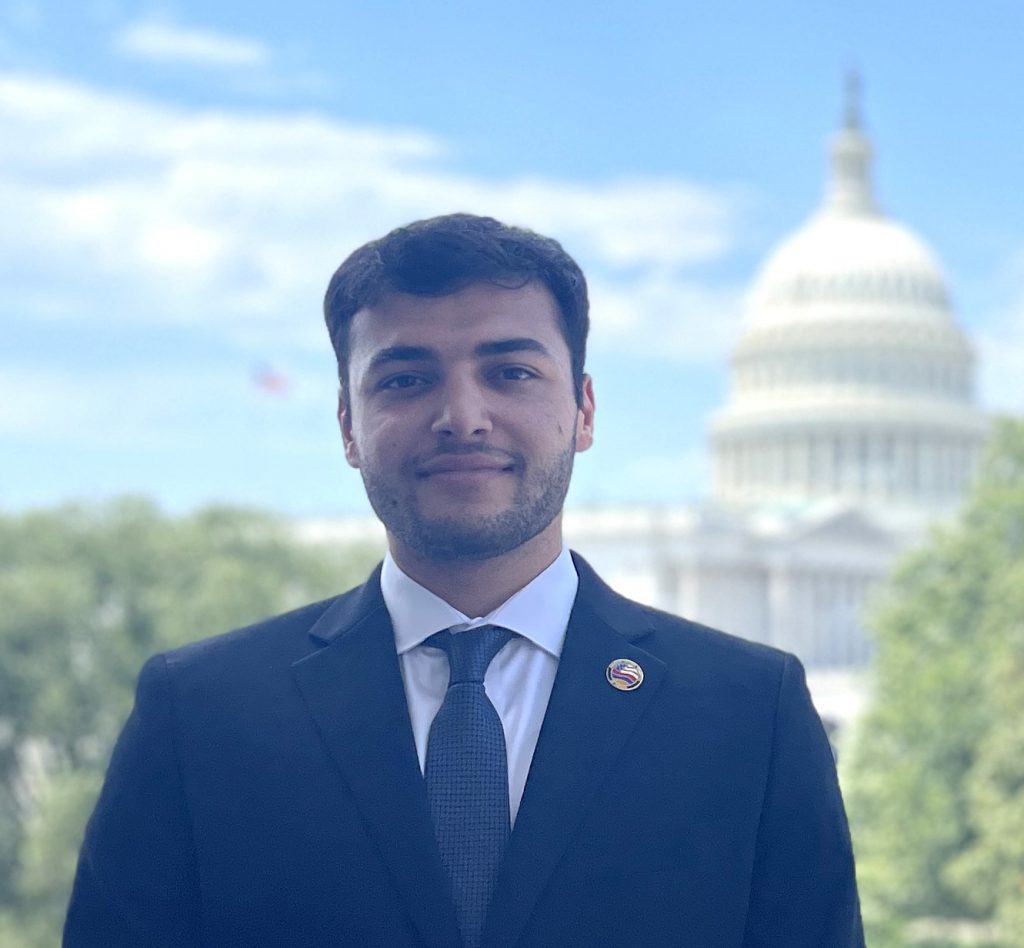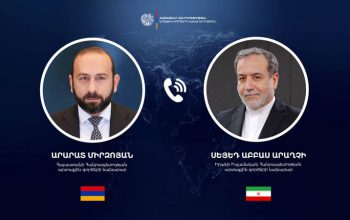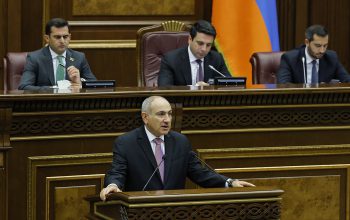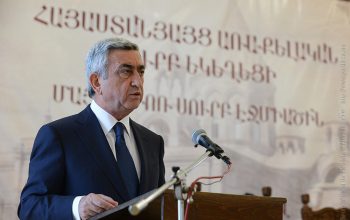By Gregory Akopyan
ANCA Leo Sarkisian Intern 2023

Armenia is in a unique position with most of its ethnic population living outside of the country. This presents an immense opportunity as educated and skilled diasporans can help its development. However, when culturally Westernized diasporans move to Armenia, they struggle in acclimating to the environment and people, and it must remain the job of the Armenian government to make it easier to repatriate. The diaspora can help Armenia develop through three key factors: remittances, developing a skilled labor force, and international advocacy efforts. This article will outline these three factors in more detail while discussing Armenia’s failure to properly repatriate members of the diaspora. The missing link we need for a safe, prosperous, and democratic Hayastan is a united and cohesive national vision and voice. A crucial issue present in Diaspora-Armenia relations is the lack of a united front, meaning that the diaspora and the Armenian government have pursued opposing stances on Turkey and Azerbaijan, with the government appeasing them and being pro-normalization, while the diaspora demands for history to be acknowledged so that it will not be repeated.
Remittances in Armenia
The Armenian nation is comprised of 10 million people, of which only a third live within the state of Armenia. This may be seen negatively, in conjunction with Armenia’s decreasing birthrate and attitudes of young people being pro-emigration- further exacerbating the brain drain; however, the power of Armenia’s diaspora is not to be discounted. Remittances, or money sent from the diaspora directly to family and friends in Armenia are a huge driving factor behind development and improving quality of life. Although emigration is a crucial issue for Armenia, one positive factor behind it is the ability of workers to enter higher-paying markets and send their excess earnings back home. Armenia’s GDP in 2020 was $12.6 billion dollars, with slightly over 1.3 billion dollars coming from remittances. Comparing remittances to official development assistance (ODA), it becomes clear that the diaspora is the biggest supporter of Armenia. According to The World Bank, ODA and official aid totaled $134 million in 2020, just 10% of remittances. When crisis strikes, Armenia is quick to call on the international community- Russia, the EU, and the United States for help, however in reality the diaspora is the best solution. Whereas ODA funds must travel through official channels and are subject to strict centralization and spending restrictions, remittances and other forms of diaspora-funded initiatives have the benefit of being decentralized and quickly deployable. In other words, members of the diaspora fund projects that they believe in, rather than begging for foreign funding, which often comes with heavy stipulations and restrictions. Remittances are often used by families for food, rent, medicine, and other necessities but through the creation of diaspora bonds and other initiatives mentioned below, money can be directed to the places Armenia needs most, or used to free up the state budget for more military spending.
Nation-Pashinyan Administration Strife
Robert Kocharyan’s administration in 2005 lifted the ban on dual citizenships, allowing members of the diaspora to obtain Armenian citizenship. However, they were not allowed to vote unless they live in Armenia, signifying the beginning of a new relationship between Armenia and its diaspora. Today, the main problem with diaspora involvement and investment is due to the split in national ideology, whereas most Armenians have different priorities and are philosophically at odds with the government of Armenia. One point where the diaspora and the government have very different priorities is concerning Turkey. Diaspora-led initiatives such as “Divest Turkey” and lobbying efforts in the United States led by the ANCA consider Turkey’s honest assessment of its genocidal past and ending support for a second Armenian Genocide in Artsakh essential to the expansion of diplomatic and economic ties, while Yerevan sees Turkey’s genocide denial as part of the status quo, something that must be accepted and forgotten on their path to building ties with Turkey. On multiple occasions, Pashinyan has expressed his willingness to engage in the normalization of relations with Azerbaijan and Turkey. In January 2023, Pashinyan said “ I believe in the normalization of relations with Azerbaijan and Turkey.” This shows a complete disregard for the wants and needs of his nation. A poll conducted by the Caucasus Research Resource Center (CRRC) found that 64% of Armenians agree that unblocking connections between Azerbaijan and Armenia would threaten Armenia’s national security. Another poll conducted by the CRRC found that 97% of Armenians see either Turkey (22%) or Azerbaijan (75%) as the main enemy of Armenia. By normalizing relations with Turkey and Azerbaijan, Pashinyan is disregarding the concerns of most of his nation including the diaspora- Armenia’s most valuable asset.
The influx of Skilled Labor
Another way the diaspora can help Armenia develop is through the influx of a highly skilled labor force. Diasporans are encouraged to return to Armenia through various programs such as iGorts, Repat Armenia, and Birthright Armenia / Armenia Volunteer Corps. These programs give diasporans the necessary resources to move to Armenia and begin their careers here. For example, the iGorts program is looking for university-educated diasporans with between three and five years of professional experience to come to Armenia and work in the public sector within state agencies for one year. Taking a step back to look at emigration– although it is a negative factor that many young people leave Armenia, it can quickly be turned into a strength. Armenian citizens who study abroad often stay in these secondary countries due to increased opportunities compared to the homeland. Regardless, the various programs mentioned give interested diasporans the opportunity to return and help their homeland.
Diaspora-Armenia Relations
Currently, the problem with Diaspora-Armenia relations is the need for a shared vision, and with blame sitting evenly between the two parties. The diaspora has failed to pressure the Armenian Government to give them full rights as citizens such as voting, and Yerevan has failed to utilize or even recognize its biggest strength, that two-thirds of our nation live abroad, a powerful force that needs to be engaged with to find compromises that will suit both sides. The government of Armenia should propose more solutions to engage diasporans, one such could be the creation of a diaspora investment fund and diaspora bonds, akin to what Israeli Prime Minister David Ben-Gurion did in 1951, with the introduction of Israeli diasporan bonds. Another way the government could entice diasporans to be more active in Armenian affairs is with the implementation of a small voluntary income tax between 5 and 10 percent which would allow Armenians living abroad to participate in elections for the board of directors of the fund, and then democratically allocate the funds to specific development projects in Armenia.
Even the leadership of Armenia recognizes there is a problem within Armenia-Diaspora relations, during the first Global Armenian Summit, an event meant to connect Armenian stakeholders from across the world, Pashinyan said “A country with such worldwide resources, such as Armenia, should not have the problems it has now. And if it has, it means that we have done and are doing a lot wrong not only in Armenia but also in Armenia-Diaspora relations”. He failed to further address what he sees as the main issues within Armenia-Diaspora relations, however, according to the evidence presented above it is fair to claim that the primary roadblock in a unified national consciousness is the issue of normalizing relations with Turkey and Azerbaijan.
Armenian Lobby in the U.S.
The Armenian diaspora holds vast political power worldwide, but it is most evident in the United States. This was visible in the 2022 midterm elections in the U.S.- “The ANCA, in conjunction with a diverse coalition of Greek, Kurdish, and Jewish allies were successful in tipping the scales against the election of Turkish nationalist Dr. Mehmet Oz in the Pennsylvania Senate race”. The Armenian lobby in the U.S. plays a crucial role in ensuring a pro-Armenia stance from politicians with large Armenian-American constituencies and is vocal in disarming Turkey and Azerbaijan while increasing ODA funding to Armenia. Armenian organizations in the U.S. also work hard to cultivate the future leaders of our nation and diaspora through various ANCA, AYF, and locally-led programs such as the ANCA’s Leo Sarkisian Summer Internship, which I am currently participating in. The ANCA has been instrumental in lobbying for funds used for demining and humanitarian aid in Artsakh, and development assistance to Armenia. On top of that, the ANCA led the charge in pressuring President Biden to officially recognize the Armenian Genocide and begin the process to hold Turkey accountable. The ANCA also leads a broad-ranging coalition in partnership with Hellenic leaders to restrict Turkey’s access to F16 upgrades and the acquisition of new F35 warplanes.
The Armenian nation lobby is often compared to the Jewish lobby while having a fraction of their fundraising capabilities and political connections, relying more on small donations from community members. The ANCA utilizes a vast network of grassroots activism to mobilize Armenian Americans to push their elected representatives to take a pro-Armenia stance and support the United States’ values of freedom, equality, and democracy abroad. To end military assistance to the dictatorial regime of Azerbaijan, the ANCA has been advocating for Congress to revoke the president’s authority to waive section 907 of The FREEDOM Support Act. Since this aid is fungible and not earmarked for specific projects, it frees up Azerbaijan’s military budget for attacks against Armenia and Artsakh, further emboldening their encroachment and aggressive behavior.
As discussed above, the Armenian Diaspora is the most important institution in promoting the democratic development of Armenia. Through the diasporas prevailing economic support, skilled workforce, and political lobbying they ensure the success of the Armenian state and prosperity for generations to come, however, the Diaspora cannot accomplish these goals alone. To transform Armenia equitably and inclusively, cooperation between all public and private sector stakeholders is needed. With sorrow for the past and bright eyes for the future, Armenia lays its trust in the current generation of youth, who will lead our country into a prosperous, secure, and democratic future.
#####
Gregory Akopyan hails from Seattle, Washington, and is a rising junior at the American University of Armenia (AUA) majoring in Politics and Governance and minoring in Environmental Studies. Since arriving at AUA, he has been an active member of the student body, becoming a peer mentor and Student Council member. Greg also got involved with the Seattle Armenian community where he serves on the altar at the Holy Resurrection Armenian Apostolic Church. He helped revitalize the Seattle ACYO in 2019 and volunteers at the annual summer camp and cultural festival. He participated in the 2023 ANCA Leo Sarkisian Summer Internship because of his passion for the long-term success of Armenia and Artsakh and his commitment to elevating the Armenian American voice in the halls of government.




